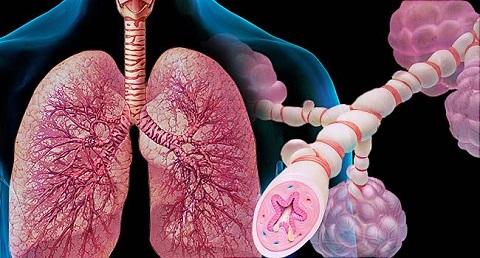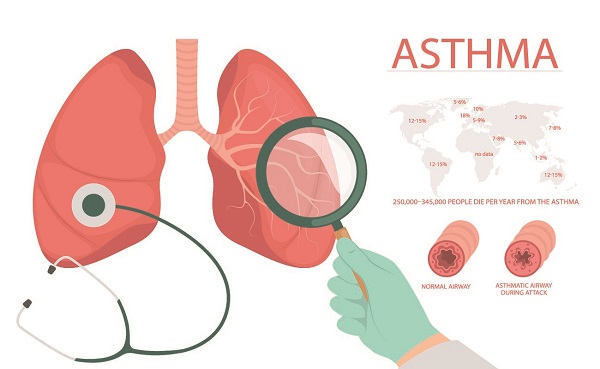Asthma
Asthma is a Disease Affecting The Air That Carries Air From The Lungs.
Introduction
Asthma is a long-term lung condition where the airways become inflamed and narrow, affecting millions of people worldwide. Its symptoms can range from mild wheezing to severe difficulty in breathing, underscoring the necessity for effective management strategies.
Around the world, more and more people are getting asthma, affecting all age groups. This increase highlights the urgent need for comprehensive treatment approaches that go beyond conventional methods. Traditional treatments often include inhalers and medications; however, there’s a growing interest in exploring holistic approaches that address underlying causes rather than just alleviating symptoms.
Disha Arogya Dham Ayurveda Naturopathy Hospital offers a unique, comprehensive approach to treating asthma through holistic and natural methods. By combining:
- Herbal Remedies
- Dietary Adjustments
- Breathing Exercises
- Detoxification Procedures
- Lifestyle Modifications
These treatments aim to address the root causes of asthma and improve overall health. This integrated approach not only targets symptom relief but also enhances the patient’s quality of life by fostering long-term well-being. Engaging with such personalized treatment plans can empower individuals in managing and potentially reducing the impact of their condition.
Understanding Asthma
Asthma comes in different forms, mainly divided into allergic and non-allergic types. Allergic asthma is caused by allergens like pollen, dust mites, or pet dander, affecting people who might also have other allergic conditions like hay fever. Non-allergic asthma, on the other hand, may be triggered by things like stress, exercise, or exposure to cold air.
People with asthma often experience a set of common symptoms that can vary in intensity:
- Shortness of breath
- Wheezing
- Chest tightness
- Persistent cough
These symptoms can significantly impact daily life and require careful management.
Factors Contributing to Asthma
Several factors contribute to the onset and exacerbation of asthma:
- Environmental irritants such as tobacco smoke, pollution, and strong odors are known triggers.
- Allergies remain a significant cause, with substances like mold spores and cockroach waste posing risks.
- Additionally, respiratory infections, particularly viral illnesses like the common cold or flu, can aggravate asthma symptoms.
Understanding these elements is vital for effective management and prevention strategies tailored to individual needs. This comprehensive view provides the foundation for exploring holistic treatment options that address not only the symptoms but also the root causes of asthma.
The Holistic Approach to Asthma Treatment
Exploring holistic methods for asthma management can offer a more comprehensive and effective way to tackle this chronic condition. Disha Arogya Dham Ayurveda Naturopathy Hospital is known for utilizing natural methods that focus on addressing the root causes of asthma and improving overall health. By combining various treatments, including herbal remedies, dietary adjustments, breathing exercises, detoxification procedures, and lifestyle modifications, the aim is not only to alleviate symptoms but also to enhance lung function and quality of life.
1. Herbal Remedies for Asthma Management
Herbal remedies play a significant role in natural asthma treatment plans. These remedies leverage specific herbs known for their potential to reduce inflammation and improve lung function. Some notable herbs include:
- Turmeric: Known for its anti-inflammatory properties, turmeric can help in reducing airway inflammation.
- Ginger: Often used to soothe respiratory ailments, ginger may reduce airway hyperresponsiveness.
- Licorice Root: Acts as an expectorant and helps clear mucus from the lungs.
- Thyme: Contains thymol, which has antiseptic properties that can support respiratory health.
These herbs are integrated into the overall treatment plan at Disha Arogya Dham. The approach is personalized based on individual needs, ensuring that each patient receives a treatment plan tailored specifically to address their unique symptoms and triggers. By incorporating these herbal options into daily routines, patients may experience reduced dependency on conventional medications while achieving better control over their asthma symptoms.
2. Personalized Treatment Plans
At Disha Arogya Dham, the approach goes beyond just using herbs. Each patient receives a customized treatment plan designed to address their specific symptoms and triggers. This personalized approach ensures that every individual gets the care they need.
3. Empowerment through Education
Understanding one’s environment and lifestyle factors that contribute to asthma is crucial in managing the condition effectively. Patients are educated about these aspects so they can make informed decisions about their health.
For instance, resources like Open Airways for Schools provide valuable insights into managing asthma in educational settings.
4. Preventive Strategy
The holistic approach at Disha Arogya Dham emphasizes prevention by strengthening the body’s resilience against common asthma triggers. This proactive method aims to reduce future flare-ups and promote long-term respiratory health.
By combining these elements into their daily lives, patients may find themselves relying less on traditional medications while gaining better control over their asthma symptoms.
This multi-faceted treatment plan not only targets immediate concerns but also promotes long-term respiratory health by leveraging nature’s own healing power. Such strategies align with recommendations found in various asthma management guidelines, further enhancing the effectiveness of the holistic approach employed at Disha Arogya Dham.
2. Dietary Adjustments for Asthma Patients
At Disha Arogya Dham Ayurveda Naturopathy Hospital, we believe in a holistic approach to managing asthma, which includes making dietary adjustments. One of the key aspects of this approach is focusing on a diet that is rich in antioxidants and omega-3 fatty acids. These nutrients have been shown to have anti-inflammatory properties and can help support lung health. You can find them in foods such as:
- Fatty fish like salmon and mackerel
- Nuts and seeds
- Leafy green vegetables
- Berries
On the other hand, there are certain foods that may worsen asthma symptoms or even trigger attacks. It’s important for asthma patients to steer clear of:
- Processed foods that are high in preservatives and artificial additives
- Dairy products if they lead to mucus production
- Foods containing sulfites, such as dried fruits and wine
By making these dietary adjustments, we aim to address the underlying causes of asthma rather than just treating the symptoms. This aligns with Ayurvedic principles that prioritize overall health and well-being. By incorporating these nutritional strategies into their daily lives, individuals with asthma can experience more effective and comprehensive management of their condition, as suggested by experts in the field, including those from the DAD Ayurveda Clinic.
Breathing Exercises and Techniques for Asthma Relief
Breathing exercises are an essential component of holistic methods for asthma management. These treatments aim to address the root causes of asthma and improve overall health. At Disha Arogya Dham Ayurveda Naturopathy Hospital, yogic breathing techniques are emphasized for their benefits in enhancing lung capacity and promoting relaxation.
Benefits of Yogic Breathing Techniques:
- Improved Lung Function: Regular practice can increase lung capacity, allowing for better oxygenation.
- Stress Reduction: Promotes relaxation, which is crucial as stress can exacerbate asthma symptoms.
Recommended Breathing Exercises:
- Pranayama: Involves controlled breathing patterns that enhance respiratory efficiency.
- Buteyko Method: Focuses on reducing hyperventilation and improving carbon dioxide levels in the blood.
- Diaphragmatic Breathing: Strengthens the diaphragm, helping to alleviate shortness of breath.
These natural methods for asthma management align with Ayurvedic principles, focusing on treating the root causes rather than just alleviating symptoms.
4. Detoxification Procedures at Disha Arogya Dham
Disha Arogya Dham Ayurveda Naturopathy Hospital offers a comprehensive approach to asthma treatment through holistic and natural methods. Detoxification procedures play a pivotal role in this approach, aiming to cleanse the body of toxins that may burden the respiratory system. These treatments target the root causes of asthma, enhancing overall health and supporting respiratory function.
- Ayurvedic Principles: Emphasizing balance and purification, these procedures align with traditional Ayurvedic practices.
- Herbal Therapies: Incorporating herbal remedies known for their detoxifying properties.
- Respiratory Health Focus: Aimed at reducing inflammation and improving lung function.
This integration of detoxification therapies complements dietary adjustments, breathing exercises, and lifestyle modifications, creating a robust framework for managing asthma effectively.
Lifestyle Changes to Help Manage Asthma
Making lifestyle changes can have a big impact on managing asthma and improving your overall health. Here are some key modifications to consider:
1. Get Moving
Regular exercise is important for everyone, including those with asthma. It improves heart health, strengthens the muscles used for breathing, and boosts the immune system. Opt for low-impact activities like walking, swimming, or cycling that are gentle on the body.
2. Find Your Zen
Stress can worsen asthma symptoms, so it’s crucial to find ways to relax and unwind. Incorporate stress relief practices such as meditation or yoga into your routine. These activities promote relaxation, reduce anxiety, and may help alleviate asthma symptoms.
3. Explore Holistic Approaches
Disha Arogya Dham Ayurveda Naturopathy Hospital offers holistic methods that focus on addressing the underlying causes of asthma. Their treatments combine herbal remedies with lifestyle changes to improve overall health and quality of life.
Remember, these lifestyle modifications should complement any medical treatment prescribed by your healthcare provider. Always consult with them before making any significant changes to your routine.
Naturopathic Treatments and Environmental Triggers in Asthma Care
Asthma patients often encounter environmental triggers that worsen their symptoms. Common causes include:
- Dust mites: These tiny creatures live in household dust and can make asthma worse.
- Pollen: Seasonal pollen from trees, grasses, and weeds is a common trigger.
Addressing these triggers through naturopathic treatments can help manage asthma effectively. This approach focuses on non-invasive techniques that bolster the body’s natural healing abilities. Some of these methods include:
- Air purification: Using air filters to reduce indoor allergens like dust mites and pollen.
- Natural remedies: Essential oils such as eucalyptus or tea tree oil may help reduce nasal congestion and improve breathing.
- Acupuncture: This ancient practice can help alleviate respiratory issues by promoting balance within the body.
Implementing these strategies can aid in minimizing the impact of environmental irritants on asthma, providing patients with a holistic path to better respiratory health.
Additional Therapeutic Options at Disha Arogya Dham
Osteopathy in Asthma Treatment
Osteopathy is a valuable therapeutic option for asthma management at Disha Arogya Dham Ayurveda Naturopathy Hospital. By using manual therapy techniques, osteopathy can significantly enhance breathing mechanics. This method targets the musculoskeletal system to improve respiratory function, providing relief from the physical strain often associated with chronic asthma. The gentle manipulation of muscles and joints not only helps in easing breathing difficulties but also supports the body’s natural healing process.
Hyperbaric Oxygen Therapy (HBOT) for Asthma Management
Hyperbaric Oxygen Therapy (HBOT) is another innovative approach explored at Disha Arogya Dham. While still considered experimental in asthma treatment, HBOT involves breathing pure oxygen in a pressurized environment, which may help reduce airway inflammation and promote healing within lung tissues. Emerging research suggests potential benefits of HBOT for individuals with asthma, offering hope for those seeking alternative or complementary treatments. Through such advanced therapies, the hospital continues to pioneer comprehensive strategies aimed at addressing the root causes of asthma and enhancing overall health.
What Should Asthma Patients Avoid?
Asthma management involves identifying and avoiding asthma triggers that can worsen symptoms. Here are some common allergens and irritants to be mindful of:
1. Intense Emotions
Strong emotions such as stress, anger, or excitement can trigger asthma symptoms. It’s beneficial to practice relaxation techniques and stress management strategies to maintain emotional balance.
2. Extreme Weather Conditions
Sudden changes in temperature, high humidity, or cold air can aggravate asthma. Staying indoors during adverse weather and using a scarf over the mouth and nose in cold conditions can help alleviate potential triggers.
3. Certain Medications
Certain medications may also worsen asthma symptoms. Particular attention should be given to:
- Nonsteroidal anti-inflammatory drugs (NSAIDs): Medications like aspirin and some pain relievers might exacerbate asthma for certain individuals. Consulting with a healthcare provider to find suitable alternatives is advisable.
By remaining vigilant about these triggers, asthma patients can better manage their condition and improve their quality of life.
Conclusion: Embracing a Comprehensive Approach to Treating Asthma
Asthma patients are encouraged to explore holistic and natural methods for better health management. Disha Arogya Dham Ayurveda Naturopathy Hospital offers a comprehensive approach to treating asthma, integrating various therapies that aim not only to alleviate symptoms but also to address the root causes of this condition.
By combining herbal remedies, dietary adjustments, breathing exercises, detoxification procedures, and lifestyle modifications, these treatments strive to enhance overall health. This approach acknowledges the complexity of asthma and seeks to provide relief through natural means.
Personalized treatment plans are essential in effectively managing asthma, as each individual’s needs and triggers may differ. Tailoring strategies to suit specific conditions, preferences, and lifestyles ensures that care is both effective and sustainable.
The potential benefits of embracing such a comprehensive approach include improved lung function, reduced inflammation, and an enhanced quality of life. By leveraging these diverse modalities, individuals with asthma can gain greater control over their condition and enjoy a healthier life.

FAQs (Frequently Asked Questions)
What is the approach of Disha Arogya Dham Ayurveda Naturopathy Hospital towards treating asthma?
Disha Arogya Dham Ayurveda Naturopathy Hospital offers a comprehensive approach to treating asthma through holistic and natural methods. This includes herbal remedies, dietary adjustments, breathing exercises, detoxification procedures, and lifestyle modifications aimed
at addressing the root causes of asthma and improving overall health.
What are the common causes and symptoms of asthma?
Asthma can be caused by various factors including respiratory infections, environmental irritants, and allergies. Common symptoms experienced by patients include wheezing, shortness of bre
ath, chest tightness, and coughing.
How do herbal remedies fit into asthma management at Disha Arogya Dham?
Herbal remedies play a crucial role in managing asthma at Disha Arogya Dham. Specific herbs are known to aid in reducing inflammation and improving lung function, which are essential for effective asthma management.
What dietary adjustments should asthma patients consider?
Asthma patients should focus on a balanced diet rich in antioxidants and omega-3 fatty acids while avoiding foods that may trigger their symptoms. It is important to treat the root causes rather than just the symptoms through dietary changes.
What breathing exercises are recommended for asthma relief?
Breathing exercises such as yogic breathing techniques are highly beneficial for enhancing lung capacity and promoting relaxation. These exercises can help alleviate asthma symptoms and improve overall respiratory health.
What detoxification procedures does Disha Arogya Dham offer for asthma patients?
Disha Arogya Dham incorporates detoxification procedures as part of its holistic approach to treating asthma. These procedures aim to cleanse the body of toxins that may contribute to respiratory issues, thereby supporting better lung health.
















